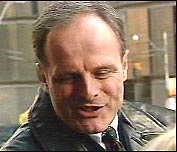|
|

INDEPTH: TORONTO POLICE: CORRUPT COPS?
Timeline: 1999
CBC News Online | Aug. 16, 2004
April 1999: Drug squad allegations surface
A letter sent to police Internal Affairs raises allegations of
wrongdoing by Toronto's Central Field Command's drug squad. The letter
is written by several defence lawyers, including Clayton Ruby and Edward
Sapiano. It claims that police from Central Field Command drug squad
stole drugs, money and jewelry from the lawyers' clients during raids.
Police Internal Affairs begins an investigation.
August 1999: Lawsuit against drug squad officers
Three people file suit against at least 10 officers in the Central Field
Command drug squad alleging false arrest, assault and battery. The case
is settled in September 2003 when police agree to pay Phan Ni Pham and
her two sons $50,000. Police also issue a formal apology to the family.
By January 2003 at least 10 people have launched civil suits, claiming
millions in damages and all naming the same group of drug squad
officers. The suits allege that drug squad officers used search warrants
to rob the homes and safety deposit boxes of suspected drug dealers.

Staff. Sgt. John Schertzer
|
Among the officers named are Staff Sergeant John
Schertzer, and constables Ned Maodus, Mike Abbott, Steven Correia and
Mark Denton. Several suits are settled out of court with their terms
undisclosed. The officers maintain their innocence. The accusations have
never been proven in court.
October 1999: Drug cases stayed
The federal government begins to stay drug cases that have involved some
drug squad officers. No reasons are given. At least 80 people involved
in 50 cases walk free between December 1999 and August 2001. Eventually
at least 200 cases are stayed ranging from minor prosecutions to a
$50-million heroin seizure because of questions about the officers.
In affidavits unsealed in 2004, the task force investigating the
complaints concludes that 83 per cent of the drug charges laid by the
unit headed by Staff Sergeant John Schertzer were later either stayed or
withdrawn. In the affidavits, Chief Supt. John Neily estimates that
2,100 prosecutions and 600 search warrants would have to be
reinvestigated.
November 1999: Financial irregularities discovered in drug squad
A routine audit in the drug squad's finances turns up irregularities in
the so-called "fink fund," used to pay informants. Later, eight drug
squad members and five members of the elite ROPE unit are charged.
Eventually two ROPE officers are acquitted and charges are dropped
against the other three. Charges against the eight drug squad officers
are stayed in Feb. 2002 because of concerns that the prosecutions could
jeopardize another criminal investigation. By then, an RCMP-led
investigation into allegations of misconduct is underway.
November 1999: Drug Squad officer charged
Central Field Command officer Mark Denton is charged with possession of
hashish for the purpose of trafficking. In 2002 a judge rules Denton's
rights were violated during a search of his vehicle. Charges are
dismissed.
December 1999: Boothby confirms investigation
Police
Chief David Boothby confirms publicly that an internal investigation is
underway into allegations that police had planted evidence and stolen
jewelry and thousands of dollars during several major drug
investigations over the previous few years. By this point federal
prosecutors have stayed at least eight drug trials until the
investigation is over. It is revealed that some members of the drug
squad have been removed from the unit.
 NEXT: TIMELINE:
2000: Toronto gets new chief of police... RCMP launch organized crime
probe... eight drug squad officers face 75 criminal charges and 98
Police Services Act charges. NEXT: TIMELINE:
2000: Toronto gets new chief of police... RCMP launch organized crime
probe... eight drug squad officers face 75 criminal charges and 98
Police Services Act charges.
^TOP
|
|
 |
 MENU MENU |
|
|
 MORE: MORE: |
|
|
|
|